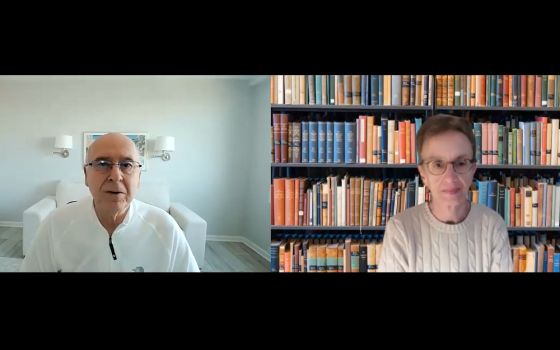
"In this new wasteland, I came to know myself more deeply." (Unsplash/Ryan Cheng)
I remember giving up chocolates (which I still love) for Lent when I was a child, and making other sacrifices like fasting and rising early for daily Mass. The nuns explained that these practices made us strong. They bolstered our self-control (one of the behavioral marks on our quarterly report cards). I was always a "good girl," so of course I made more Lenten resolutions than there were holy days of obligation.
As the years wore on and as the Second Vatican Council brought innumerable changes in the practice of my faith, I had a different take on Lenten resolutions. I grew skeptical about "making sacrifices" because I was discovering too many sacrifices that came uninvited. Why, I wondered, should we take on self-imposed hardships when so many disadvantages were dumped on us already? Our task, I believed, in Lent or in any season, was to cope nobly and to find meaning in the suffering and losses that inevitably came into our lives.
But now that I'm one of the "golden girls," I realize that my childhood training paid off. The nuns schooled me to live with a traditional Lenten theme: a time with Jesus in the wilderness. The desert is the archetypal place of confronting ourselves, a place where we analyze our motives, question our behavior, investigate our future and find meaning in any suffering we may have experienced. In the desert there are no roads or maps, just the time and space to know God and ourselves in a clearer way.
Advertisement
My desert time was initiated by God and expedited by the institutional church. God called me into an uncharted wilderness in 1971 when I was asked to accompany lesbian and gay people in their quest to find a spiritual home in their own church — the Catholic Church. This was unknown and, at that time, dangerous, parched territory.
I soon found that, unlike my own religious community leaders, who were visionary women who supported and encouraged this ministry, powerful men in the Vatican did not appreciate my outreach to LGBTQ people. After years of not being allowed by a number of local bishops to speak in parishes in their dioceses, in 1999 the Vatican declared I should no longer minister to LGBTQ people. My religious community leaders, who had supported me from the beginning, were afraid of internal and external repercussions if I continued to minister to LGBTQ Catholics. After a year of discernment, I believed that God was still calling me to be an advocate for them and an intermediary between them and the church.
I became a persona non grata in church circles. This exclusion was extremely painful because I loved my church and wanted to be respected and valued in it. When I had taught mathematics at a Catholic college for women, I had enjoyed prestige in the academy. Now I was an ecclesiastical outcast, one who was shunned because of notoriety.
In this new wasteland, I came to know myself more deeply. I now realize that I am often tempted to possess "the power and the glory" of wanting the good opinion of others. In my convent formation, we called this the temptation of "human respect" — the longing to be respected by other human beings. I desired to be a force for good and to make a difference in people's lives, but I wanted all this while also being loved, respected and understood. But this "power and glory" is not to be found in the desert.
During these desert years, I was tempted to throw myself down from the pinnacle of the temple into the depths of work and I did just that.
During these desert years, I was tempted to throw myself down from the pinnacle of the temple into the depths of work and I did just that. I expected that God would catch me and supply my emotional and psychological needs. It was the longest Lent of my life.
Every Lent does end in an Easter, however, whether it comes in 40 days or 40 or more years. I have experienced a ministerial and personal resurrection in my church because of Pope Francis' recent letters to me and New Ways Ministry.
In letters to New Ways Ministry's current director, Francis DeBernardo, the pope acknowledged that our ministry's "history has not been an easy one, but that loving one's neighbor is still the second commandment, tied 'necessarily' to the first commandment to love God. Thank you for your neighborly work." In another letter, Francis wrote about my ministry, saying, "I know how much she has suffered. … She is a valiant woman who makes her decisions in prayer."
In his congratulatory letter on my five decades in LGBTQ ministry, Francis graciously wrote that my ministry reminded him of "the 'style' of God … You have not been afraid of 'closeness,' and in getting close you did it 'suffering with' (compassion) and without condemning anyone, but with the 'tenderness' of a sister and a mother."
His letters are like the soothing hand of a friend who has reached out to heal my wounds and lead me out of a long and barren wasteland.
Not surprisingly, I still need time in the desert to practice self-discipline, to ponder the meaning of suffering, to fast, and to strengthen my resolve for difficulties in the future.
The fasting I am now practicing is learning to accept the limitations of age. I seem to be running out of steam to engage in all the projects for LGBTQ people that are still so needed. While there has been enormous progress in society and in our church in the last 50 years, there is so much more that must be done in order for LGBTQ people to be treated with the respect they deserve as children of God.
As I am slowing down, I think a lot about the nuns who taught me in grade school and high school. I am so grateful to them, not only for the Lenten practices they taught me, but also for the solid spiritual foundation they gave me. At the New Ways Ministry office, we often speak fondly about the nuns of yesteryear, whose teachings about discipline and responsibility sometimes seem old-fashioned. We just smile and say, "Sometimes the old ways are better."
And yes, sometimes the old ways are new ways.







